Ninotchka Blu-ray Movie
HomeNinotchka Blu-ray Movie 
Warner Bros. | 1939 | 111 min | Not rated | Jun 09, 2015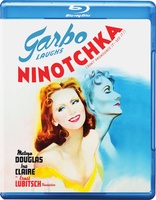
Movie rating
7.8 | / 10 |
Blu-ray rating
| Users | 0.0 | |
| Reviewer | 4.0 | |
| Overall | 4.0 |
Overview
Ninotchka (1939)
A stern Russian woman sent to Paris on official business finds herself attracted to a man who represents everything she is supposed to detest.
Starring: Greta Garbo, Melvyn Douglas, Ina Claire, Bela Lugosi, Sig RumanDirector: Ernst Lubitsch
| Romance | 100% |
| Comedy | Insignificant |
Specifications
Video
Video codec: MPEG-4 AVC
Video resolution: 1080p
Aspect ratio: 1.37:1
Original aspect ratio: 1.37:1
Audio
English: DTS-HD Master Audio Mono (48kHz, 24-bit)
French: Dolby Digital Mono
Spanish: Dolby Digital Mono
Spanish: Dolby Digital Mono (Spain)
Portuguese: Dolby Digital Mono
Subtitles
English SDH, French, Spanish, Portuguese
Discs
25GB Blu-ray Disc
Single disc (1 BD)
Playback
Region A, B (C untested)
Review
Rating summary
| Movie | 4.5 | |
| Video | 4.0 | |
| Audio | 4.0 | |
| Extras | 1.5 | |
| Overall | 4.0 |
Ninotchka Blu-ray Movie Review
Comrades Arm-in-Arm
Reviewed by Michael Reuben June 5, 2015The famous advertising tag, "Garbo laughs!" was created even before the script was written, but the great star's funniest moments in Ninotchka are those where her celebrated face remains sternly impassive. In her first comedy and next-to-last film, Greta Garbo proved a mistress of deadpan, playing a Stalinist apparatchik who is plunked down in the middle of pre-war Paris like a visitor from outer space sent to study alien customs. Fifty years later, Arnold Schwarzenegger had to play a similar Russian in Red Heat and was reportedly advised by director Walter Hill to study Garbo's performance, but for the real payoff, look at Terminator 2. The comedic interplay between Arnold's stoic T-101 and the frenetic young John Connor, which is essential to the film's humanity, owes its rhythm and timing to the duel of wits between Garbo and Melvyn Douglas in Ninotchka. Making fun of the Soviet Union was a ticklish business in 1939, as the storm gathered and broke in Europe. By the time Ninotchka appeared in October, Nazi Germany had signed a treaty with Stalin and invaded Poland, and Britain and France had declared war. Those who favored America's involvement knew that it would eventually need Russia as an ally, despite the countries' ideological divide. But director Ernst Lubitsch, working from a witty script by Billy Wilder, Charles Brackett and Walter Reisch, spun the satire of communism with the famous "Lubitsch Touch" that, three years later, would allow him to pull off a comedy about Nazis while America was in the thick of the conflict, To Be or Not to Be. Even so, Ninotchka was banned in the U.S.S.R. and its satellites for many years. In Europe and America, it was a hit and probably would have won multiple Oscars, if it hadn't been up against the juggernaut of Gone with the Wind. The film is now part of the Library of Congress' National Film Registry.
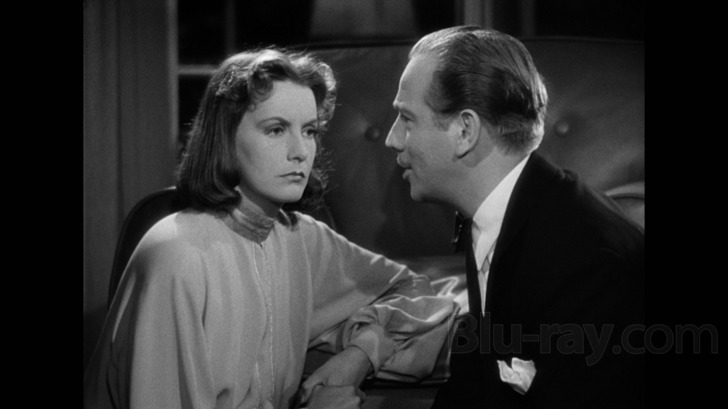
"This picture takes place in Paris", reads the Prologue, "in those wonderful days when a siren was a brunette and not an alarm—and if a Frenchman turned out the light it was not on account of an air raid!" With the mood properly set, we are introduced to the film's version of the Three Stooges: Iranoff (Sig Ruman), Buljanoff (Felix Bressart) and Kopalski (Alexander Granach), whose slapstick is more verbal than physical. They have been sent to Paris to sell the fabulous jewels confiscated during the revolution from the Grand Duchess Swana (Ina Claire), because Moscow needs funds. Unfortunately for the trio, they are overheard negotiating with a jeweler by an exiled Russian nobleman, Count Rakonin (Gregory Gaye), who has been reduced to working as a waiter at the luxury hotel where the Moscow representatives have taken a suite. Rakonin immediately alerts the Duchess that her precious jewels are in Paris, and she begins scheming to recover them. The Duchess' boyfriend is the charming but penniless Count Leon d'Algout (Melvyn Douglas), who promptly ties up the jewels in a court case, prompting Moscow to send a special envoy to take charge. Her name is Nina Ivanovna Yakushova a/k/a "Ninotchka" (Garbo), and she is a true believer in the Soviet state. "The last mass trials were a great success", she says, reporting on the latest Moscow news. "There are going to be fewer but better Russians." By the sort of contrivance that Chaplin might have invented, Leon and Ninotchka connect and intrigue each other without realizing that they are adversaries. When they discover their true identities, it is too late to disentangle their feelings. Even though Leon hasn't made Ninotchka laugh by this point, it is only a matter of time before he does so, and then, of course, everything changes. Even when the Duchess realizes that she is losing her man and tries to intervene, she is outmatched. (The face-off between the two women gives new meaning to the phrase "if looks could kill".) Now distracted from her duty, the newly awakened Ninotchka finds herself open to the enchantments of the decadent capitalist society she used to despise: champagne, nightlife, Parisian fashions and, above all, love. When she must return to Moscow, it is like Cinderella leaving the ball (minus the glass slipper). Leon's attempt to obtain a visa to follow her is just one of the film's many deft parodies of bureaucracy run amuck. While the film's third act may seem to take a long time to resolve the romantic complications, we are dealing with thorny issues of geopolitics. As compensation, Ninotchka rewards us with an appearance by Bela Lugosi as Commissar Razinin, the Moscow superior who intimidates Iranoff, Buljanoff, Kopalski and even Ninotchka herself. Lugosi makes such a convincing Soviet taskmaster that it's a shame he couldn't have held out to play villains in post-war spy films. In a single scene, he leaves a lasting impression.
Ninotchka Blu-ray Movie, Video Quality 
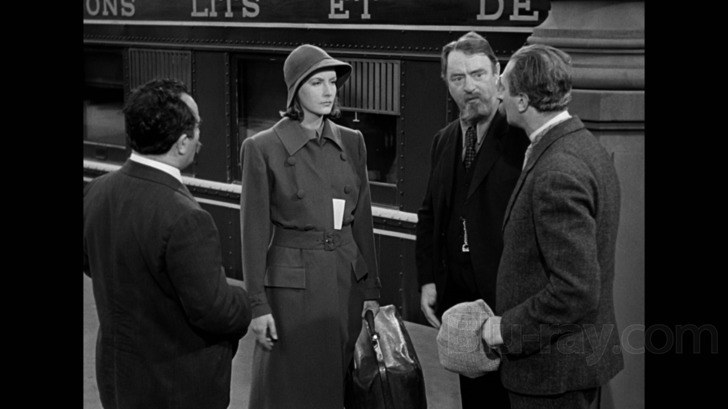
Garbo's preferred cinematographer, William H. Daniels (Grand Hotel, among many others), shot Ninotchka in lustrous black-and-white, which has been transferred to Blu-ray by Warner, which now owns the pre-May 1986 MGM library. As with so many of those films, the original negative was lost in a 1978 fire at the George Eastman House, but MGM had made a fine grain positive as a preservation element in the Sixties, which is now the best available source. The 1080p, AVC-encoded Blu-ray is a respectable catalog effort, with solid blacks, finely delineated shades of gray and a naturally rendered grain pattern that ably reproduces the detail of the backlot and soundstage re-creation of Paris in the late Thirties. Elaborate sets such as the sumptuous hotel suite, the Duchess' apartment and Leon's bachelor quarters can be appreciated for their decor, and the faces of the working class crowd in the restaurant to which Leon trails Nintochka are distinct and individual. The densities are excellent throughout, and the source material is pristine. Warner has mastered Ninotchka with an average bitrate of 21.95 Mbps, which is on the low side but is less of a concern here where so many scenes involve conversation with little movement. Careful allocation of bits by the compressionist allows more elaborate sequences like the party that Leon stages for Iranoff, Buljanoff and Kopalski, or the nightclub scene, to spike upward, and artifacts were not an issue.
Ninotchka Blu-ray Movie, Audio Quality 
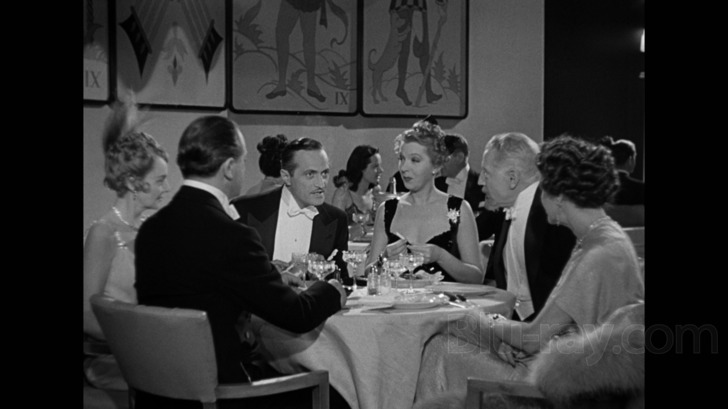
Ninotchka's mono soundtrack has been encoded in lossless DTS-HD MA 1.0, and it's charming. The dialogue is clear, and the score by Werner R. Heymann (who would go on to compose the music for Lubitsch's The Shop Around the Corner and To Be or Not to Be) plays with as good fidelity and as much dynamic range as can be expected from a recording of that era.
Ninotchka Blu-ray Movie, Special Features and Extras 

Warner released Ninotchka on DVD in 2005 with just a trailer. New to Blu-ray are a short and a cartoon.
- Prophet Without Honor (480i; 1.37:1; 10:49): A 1939 short about the life of Matthew Fontaine Maury, a 19th Century naval officer, who first charted ocean winds and currents, but suffered damage to his reputation because of his loyalty to his home state, Virginia, during the Civil War.
- The Blue Danube (480i; 1.37:1; 7:18): According to this MGM cartoon, the Danube is blue because of the efforts of a small army of woodland sprites and forest animals, who are supervised by a singing fairy. The final minute is marred by several bursts of static on the soundtrack.
- Theatrical Trailer (480i; 1.37:1; 2:19): "The Garbo you've been waiting so long to meet!"
Ninotchka Blu-ray Movie, Overall Score and Recommendation 
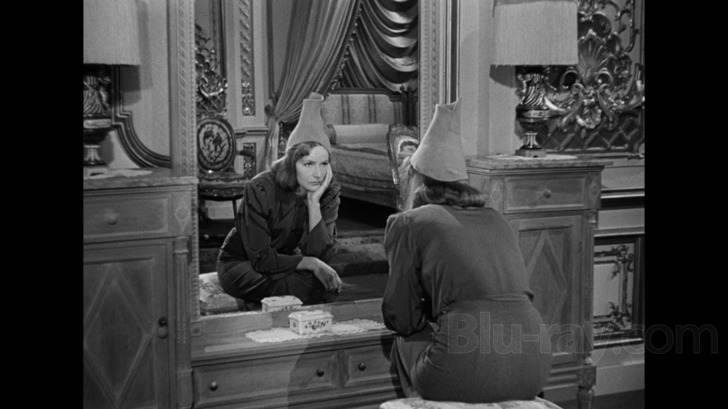
Despite the seriousness of the underlying subject, Ninotchka remains as light and frothy today as when it was first made. Garbo may have been notoriously self-conscious and insecure as an actor (which is probably why she withdrew from the movie business after her next film), but you'd never know it from what ended up on the screen. Melvyn Douglas, looking nothing like the older self who would win Oscars for Hud and Being There, makes a perfect comic foil, and Warner's Blu-ray delivers a suitable rendition. Highly recommended.
Similar titles
Similar titles you might also like

Clueless
25th Anniversary Edition
1995

The Bachelor and the Bobby-Soxer
1947

Paris When It Sizzles
1964

Blind Date
1987

Forget Paris
1995

Barefoot in the Park
1967

Another Gay Movie
2006

The Miracle of Morgan's Creek
1944

It's Complicated
2009

Storm in a Teacup
The Vivien Leigh Anniversary Collection
1937

Irrational Man
2015

The Devil Wears Prada
10th Anniversary Edition
2006

Crazy, Stupid, Love.
2011

Mr. Blandings Builds His Dream House
Warner Archive Collection
1948

Silk Stockings
Warner Archive Collection
1957

The Good Fairy
1935

Camille
Warner Archive Collection
1936

The Prince and the Showgirl
Warner Archive Collection
1957

Love Me Tonight
1932

Stand-In
1937